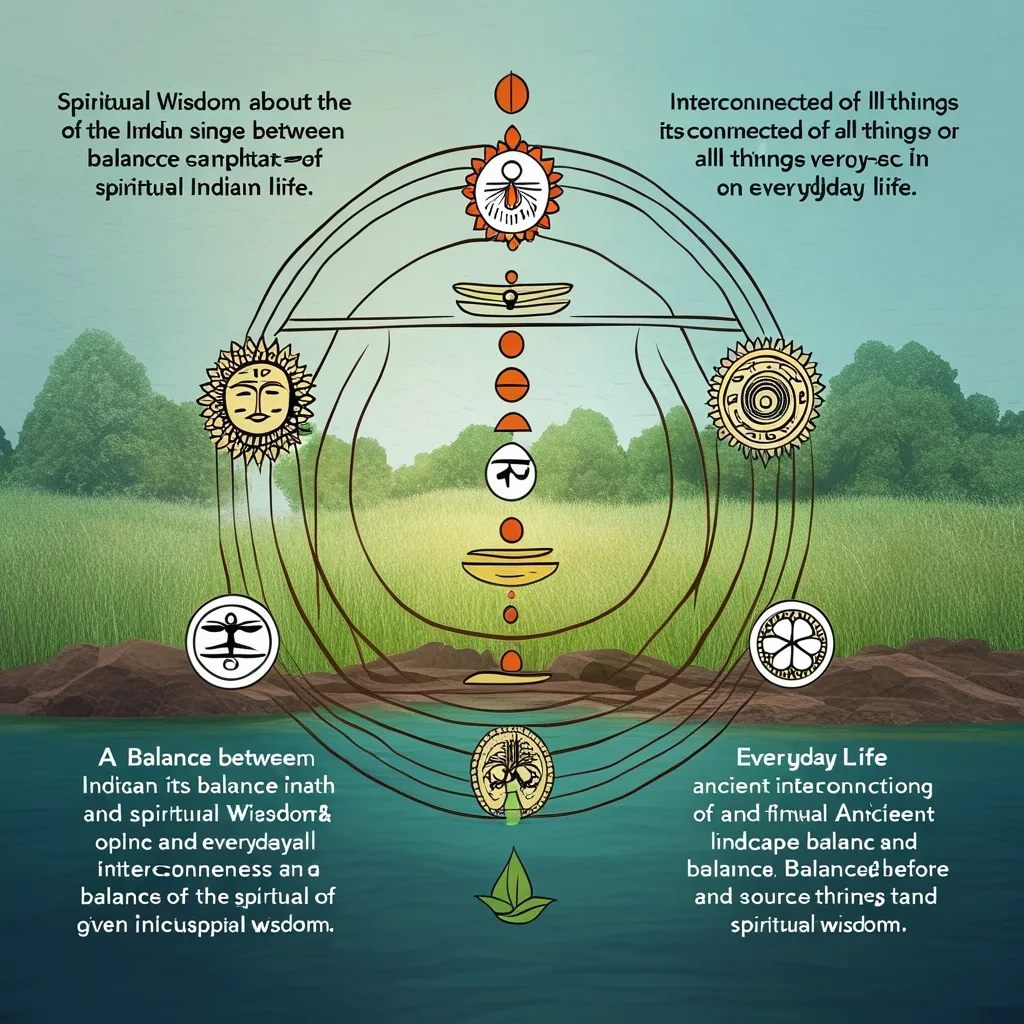The Atharva Veda: Ancient Wisdom for Modern Times
Hey there! Ever wondered about those ancient texts that seem to hold the secrets of the universe? Well, let me tell you about one that’s got people talking for centuries - the Atharva Veda.
Now, don’t let the fancy name scare you off. This isn’t your typical boring old scripture. The Atharva Veda is like the wild child of the Vedic family. While its siblings are all about praising gods and nature, this one’s got its feet firmly planted in the nitty-gritty of everyday life.
Picture this: you’re an ancient Indian, dealing with all sorts of daily dramas. Maybe your crops aren’t growing, or your neighbor’s giving you the evil eye. What do you do? You turn to the Atharva Veda, that’s what! This text is packed with spells, charms, and rituals for pretty much everything under the sun.
But hold up, before you start thinking it’s all hocus-pocus, there’s more to it than that. The Atharva Veda is like a time capsule, giving us a peek into the minds of our ancestors. It’s got 730 hymns and about 6,000 mantras, split into 20 books. That’s a lot of ancient wisdom to unpack!
Now, I know what you’re thinking. “Magic spells? Isn’t that dangerous?” Well, here’s the thing - the Atharva Veda isn’t about turning people into frogs or summoning demons. It’s more like a spiritual Swiss Army knife, helping people deal with life’s ups and downs.
Imagine you’re feeling under the weather. In ancient times, you might’ve been given a special plant or amulet, along with some chanted mantras. It’s not so different from modern times when we might take some herbs and say a little prayer, right?
But it’s not all about fixing problems. The Atharva Veda also covers the good stuff in life. Getting married? Starting school? There’s a ritual for that! It even talks about how kings should rule and how priests should do their thing. It’s like an ancient self-help book, covering everything from cradle to grave.
Now, let’s address the elephant in the room. Some people think the Atharva Veda is dangerous or forbidden. But that’s just not true. Sure, it’s got some intense stuff in it, but remember, this was written in a time when people saw spirits and magic in everything. It’s not meant to be taken literally in our modern world.
Here’s where it gets really interesting. The Atharva Veda isn’t just about practical stuff. It’s got some deep thoughts too. It asks big questions about life, good and evil, and what it means to be human. It’s like those late-night conversations you have with friends, pondering the meaning of existence.
But here’s the catch - you can’t just pick up the Atharva Veda and start reading. It’s written in ancient Sanskrit, with special rhythms and sounds that are super important. That’s why traditionally, you’d learn it from a guru who could explain all the tricky bits.
Now, you might be wondering, “What’s the point of studying this ancient text in our modern world?” Well, it’s like looking at a really old family photo album. It shows us where we came from, how our ancestors thought, and what they cared about. And you know what? A lot of those things aren’t so different from what we care about today.
Think about it. We still worry about our health, our relationships, and our future. We still have rituals and practices to help us feel better or more in control. The Atharva Veda just shows us how these concerns have been part of the human experience for thousands of years.
But it’s not just about looking back. The Atharva Veda can actually teach us a lot about how to live today. It’s all about finding balance, connecting with nature, and understanding our place in the universe. In our fast-paced, tech-driven world, these ancient teachings can be surprisingly relevant.
For example, the Atharva Veda talks a lot about the power of words and thoughts. Sound familiar? It’s not so different from modern ideas about positive thinking and manifestation. Or take its teachings on health - it doesn’t just focus on physical symptoms, but looks at the whole person, including their mental and spiritual state. That’s pretty much what holistic medicine is all about!
Now, I’m not saying you should ditch modern medicine for ancient charms. But there’s something to be said for understanding these old practices. They remind us that healing isn’t just about popping pills - it’s about addressing the whole person.
The Atharva Veda also has a lot to say about our relationship with nature. In a time when we’re facing climate change and environmental disasters, maybe we could learn a thing or two from our ancestors about respecting the earth.
But let’s get real for a second. The Atharva Veda isn’t all sunshine and rainbows. It’s got some stuff that might make you raise an eyebrow. There are spells for harming enemies and manipulating people’s feelings. But before you judge, remember that this text reflects a different time and culture. It’s not meant to be a literal guidebook for modern life.
Instead, think of the Atharva Veda as a mirror. It reflects human nature - the good, the bad, and the ugly. It shows us that people have always had fears, desires, and hopes. And in doing so, it reminds us of our shared humanity.
One of the coolest things about the Atharva Veda is how it blends the practical with the spiritual. It’s not just about lofty philosophical ideas or abstract concepts. It’s about applying spiritual principles to everyday life. In a way, it’s teaching us that everything is sacred - from the grandest cosmic events to the smallest daily chores.
Now, I know what some of you might be thinking. “This all sounds great, but how does it apply to my life?” Well, that’s the beauty of ancient wisdom - it’s timeless. The Atharva Veda teaches us about the power of intention, the importance of ritual, and the interconnectedness of all things. These are ideas that can enrich our lives, regardless of our personal beliefs.
Think about it this way - when you set an intention for your day, or create a little ritual to help you focus, you’re tapping into the same human impulses that the Atharva Veda addresses. When you take a moment to appreciate nature or ponder your place in the universe, you’re engaging with the same big questions that our ancestors grappled with.
But here’s the thing - you don’t have to believe in magic or ancient gods to find value in the Atharva Veda. You can approach it as a fascinating historical document, a source of poetic inspiration, or a guide to understanding human psychology. It’s all about what you bring to it.
One of the most powerful lessons from the Atharva Veda is the idea that words have power. In our age of social media and instant communication, that’s a lesson we could all stand to remember. The way we speak to others and to ourselves can shape our reality. It’s not so different from the ancient belief in the power of mantras.
Another key teaching is the importance of balance. The Atharva Veda recognizes that life is full of opposites - joy and sorrow, health and illness, success and failure. Instead of trying to eliminate the negative, it teaches us to find harmony between these opposing forces. In our world of extremes, that’s a pretty radical idea.
But perhaps the most relevant teaching for our times is the Atharva Veda’s emphasis on interconnectedness. It sees the world as a web of relationships - between humans, nature, and the divine. In an age where we’re facing global challenges that require collective action, this ancient wisdom feels particularly poignant.
So, what’s the takeaway from all this? The Atharva Veda isn’t just some dusty old text. It’s a living, breathing testament to the human experience. It reminds us that our ancestors weren’t so different from us. They had hopes, fears, and dreams, just like we do. And in exploring their world, we might just understand our own a little better.
Sure, we might not be reciting magic spells or performing ancient rituals in our daily lives. But we can still learn from the wisdom embedded in these practices. We can learn to approach life with intention, to find meaning in our daily routines, and to see the sacred in the ordinary.
In the end, the Atharva Veda is more than just a historical curiosity. It’s a reminder of our shared humanity, a source of timeless wisdom, and a call to live more mindfully. Whether you’re a spiritual seeker, a history buff, or just someone trying to make sense of this crazy world, there’s something in this ancient text for you.
So next time life throws you a curveball, why not take a page from the Atharva Veda? Set an intention, create a little ritual, and remember that you’re part of a long line of humans who’ve faced similar challenges. Who knows? You might just find some ancient wisdom that speaks to your very modern soul.






